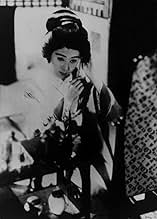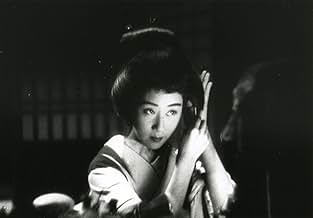IMDb RATING
7.4/10
3.2K
YOUR RATING
Two geisha sisters lead a hard life in the Gion district of Kyoto. After one of them feels obliged to support a bankrupt businessman, the other sister sets up various schemes to get rid of h... Read allTwo geisha sisters lead a hard life in the Gion district of Kyoto. After one of them feels obliged to support a bankrupt businessman, the other sister sets up various schemes to get rid of him.Two geisha sisters lead a hard life in the Gion district of Kyoto. After one of them feels obliged to support a bankrupt businessman, the other sister sets up various schemes to get rid of him.
- Director
- Writers
- Stars
- Awards
- 1 win total
Namiko Kawashima
- Oemi Furusawa
- (as Kazuko Kuno)
Fumio Ôkura
- Jurakudo, the antiques dealer
- (as Fumio Okura)
- Director
- Writers
- All cast & crew
- Production, box office & more at IMDbPro
Featured reviews
Master Mizogushi placed on screen two different kind of look of the gueishas's world, although they are sisters, the older is more wise and understanding about his position, the younger is more cold having in the men just a way to get an easy money, handling according her will, actually she hates them, along the movie the viewers will see two side of the street in two human being whose the life hurt too hard, nice piece of art of study of human nature!!!
Resume:
First watch: 2018 / How many: 1 / Source: DVD / Rating: 7.25
Resume:
First watch: 2018 / How many: 1 / Source: DVD / Rating: 7.25
Umekichi, a geisha in the Gion district of Kyoto, feels obliged to help her lover Furusawa when he asks to stay with her after becoming bankrupt and leaving his wife. However her younger sister Omocha tells her she is wasting her time and money on a loser.
Here we have another film by Mizogucki looking at "fallen women", much like "Street of Shame" twenty years later, and to some degree "Osaka Elegy". But we also have a tale of the old and the new -- looking to the West and also sticking with tradition. This is especially interesting given the radical shift in Japanese culture after World War II.
I have not seen the remake and thus cannot compare them, but how do you top the work of Mizoguchi? You simply cannot.
Here we have another film by Mizogucki looking at "fallen women", much like "Street of Shame" twenty years later, and to some degree "Osaka Elegy". But we also have a tale of the old and the new -- looking to the West and also sticking with tradition. This is especially interesting given the radical shift in Japanese culture after World War II.
I have not seen the remake and thus cannot compare them, but how do you top the work of Mizoguchi? You simply cannot.
I'm surprised by the fact that Mizoguchi was doing this kind of filmmaking and a strong criticism on geisha's lives in those years already. It must have been really innovative at the time and, for the same reason, it might probably not have been appreciated by most of the audience. I find it ironic because now it has aged considerably, that it is also hard to appreciate by today's standards. In order to fully comprehend its content, one would have to watch it with an open mind and submerge into its time. Also, the print quality might not be good, which is yet another obstacle that may keep viewers from appreciating the film as well. Fortunately, I was able to get hold of a high quality print, and it is also a great privilege to behold Mizoguchi's filmmaking techniques; I for one consider them to be of great importance in cinema history.
The story concerns two geisha sisters who live in a neighborhood known as Gion, in Kyoto. They are very different from each other; one side is influenced by a more modernized mindset, whilst the other is still rooted in traditional manners. This existing contrast will slowly unravel as the film goes on.
Technically, the film is outstanding for its time. We have that riveting tracking shot at the beginning of the film that thoroughly advances through the house of the patron of one of our two protagonists. Subsequently, you'll find yourself immersed in the many sequence shots the film is divided in.
If you're fond of Japanese cinema, you should definitely watch this forgotten gem.
My score: 8.8/10
The story concerns two geisha sisters who live in a neighborhood known as Gion, in Kyoto. They are very different from each other; one side is influenced by a more modernized mindset, whilst the other is still rooted in traditional manners. This existing contrast will slowly unravel as the film goes on.
Technically, the film is outstanding for its time. We have that riveting tracking shot at the beginning of the film that thoroughly advances through the house of the patron of one of our two protagonists. Subsequently, you'll find yourself immersed in the many sequence shots the film is divided in.
If you're fond of Japanese cinema, you should definitely watch this forgotten gem.
My score: 8.8/10
When reviewing Kenji Mizoguchi's 'Sisters of the Gion', the first and foremost thing that I have to talk about is the film's portrayal of exploited women and their sorry plight. For a film made in 1936, the film is astonishingly progressive. Mizoguchi leaves no stone unturned in showing the viewer how tough the life of a geisha was. The men whom we see engage with the sisters Omocha and Umekichi, though played by different actors are made to look very similar appearance wise and I think that was a specific choice on the part of Mizoguchi. Mizoguchi's approach to telling this story has a distinct boldness to it with a hopelessness simmering underneath. The protagonist Omocha is not a submissive character whose pain and suffering is supposed to convey the message. Instead, she is a feisty pragmatic rebel who played the game the way it is without being obstructed by any sense of morality. The feminist message is supposed to be conveyed by the fact that even fighting the system isn't enough to escape the exploitation and the abuse. These women would still continue to be treated as commodities.
What struck me about Mizoguchi's direction and visual style is his meticulous use of space in a particular frame. He sits on a frame, there is very minimal editing and he uses tracking shots quite a bit. He uses the 'frame within a frame' composition(also found in Renoir's films) quite a bit by placing characters in the background while others being in the foreground and pretty much each and every one of these visual choices serves a thematic purpose, be it conveying the difference in mindsets of Omocha and Umekichi or showing a man being lured in by Omocha's manipulation,etc. Another thing I noticed is Mizoguchi's reluctance in using too many close-ups. The close-ups in the film are used very sparsely and economically.
Due to its runtime, the film is a little light on character development or backstory, but the nuanced nature of using visuals to tell a story really impressed me. It is clear in its agenda and Mizoguchi is bold enough to express his ideas with conviction.
What struck me about Mizoguchi's direction and visual style is his meticulous use of space in a particular frame. He sits on a frame, there is very minimal editing and he uses tracking shots quite a bit. He uses the 'frame within a frame' composition(also found in Renoir's films) quite a bit by placing characters in the background while others being in the foreground and pretty much each and every one of these visual choices serves a thematic purpose, be it conveying the difference in mindsets of Omocha and Umekichi or showing a man being lured in by Omocha's manipulation,etc. Another thing I noticed is Mizoguchi's reluctance in using too many close-ups. The close-ups in the film are used very sparsely and economically.
Due to its runtime, the film is a little light on character development or backstory, but the nuanced nature of using visuals to tell a story really impressed me. It is clear in its agenda and Mizoguchi is bold enough to express his ideas with conviction.
This movie, about two geisha sisters who lead a hard life in the Gion district of Kyoto, is a good drama movie!
I personally do not have much to say about it. The movie is not amazing or incredible for my part, but it has some funny moments where the main plot is the most compelling element. It feels slow at times, but fortunately, it is quite short to be a feature film, and it is also nicely shot and the actors do good. I am glad I took it a visit because I had a good time!
Despite not being a masterpiece, this movie is a good drama with humor and a strong plot. Solid acting and visuals make it worth a watch.
I personally do not have much to say about it. The movie is not amazing or incredible for my part, but it has some funny moments where the main plot is the most compelling element. It feels slow at times, but fortunately, it is quite short to be a feature film, and it is also nicely shot and the actors do good. I am glad I took it a visit because I had a good time!
Despite not being a masterpiece, this movie is a good drama with humor and a strong plot. Solid acting and visuals make it worth a watch.
Did you know
- TriviaDaiichi Studio went into bankruptcy following the poor commercial results of the film.
- ConnectionsReferenced in Aru eiga-kantoku no shôgai (1975)
Details
- Release date
- Country of origin
- Language
- Also known as
- Sisters of the Gion
- Production company
- See more company credits at IMDbPro
Box office
- Gross worldwide
- $17,807
- Runtime
- 1h 9m(69 min)
- Color
- Aspect ratio
- 1.37 : 1
Contribute to this page
Suggest an edit or add missing content








